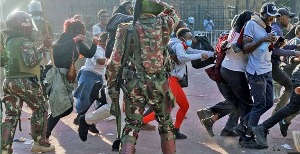The government?s agenda to reduce the importation of rice by 30 per cent is seriously being hampered by the activities of smugglers in some parts of the country.
The Techiman Market in the Brong Ahafo Region is one place where a lot of rice is said to have been smuggled to from neigbouring Cote d?Ivoire by a group of market women.
Rice market analysts estimate that about 7,800 metric tones of rice, approximately 3,000 bags weighing 50 kilogrammes per bag, are smuggled in by these women every week through Sampa, a town in the Jaman district of the Brong Ahafo, which shares border with the Cote d?Ivoire.
This, according to industry players at Techiman causes a yearly loss of about ?7.3billion in import duty and VAT revenue to the nation. The average world market price of rice is in the region of $250per metric tonnes.
A section of media practitioners on a visit to Techiman identified piles of assorted foreign brands of rice, including ROC, China, USA, India, Sombrero, Lucky, Olam, Challenger, among others, which were said to have been smuggled in an were being sold at prices below the average market price of rice in the country. The price difference between the smuggled rice and that imported through the country?s ports range from ?5,000 to ?30,000.
For example, at the time of the visit, a bag of Uncle Sam rice smuggled from Abidjan was selling at ?195,000 as against ?205,000 for the same rice imported through the Tema port, while another type, commonly known as US from Abidjan, was selling at ?290,000, as against ?300,000 for the same brand imported through the country?s ports.
The smuggling has been made possible because the country operates the highest tariff on imported rice of 22 per cent, including ECOWAS levies, in the sub-region, while Cote d?Ivoire has one of the lowest in the region.
As a result, the group of women, who are said to be in league with a transport owner, popularly known in Techiman as ?Shop-well, bribe their way through customs check points, a situation which helps to reduce the prices of their goods. After the media men had talked to some of the women, they became apprehensive, thinking that the media men were members of task force sent from Sunyani to clamp down on them. They, therefore, rescheduled the arrival of their cargoes to 10pm when all market activities had ended instead of the original time of 2pm.
According to sources in the rice trading market at Techiman, task force operatives from the Customs, Excise and Preventive Service (CEPS) in Accra and Kumasi ad visited the market on a number of occasions to verify the situation and found it to be true but stopped short of taking any action. These illegal activities are retarding the commercial activities of genuine business people in the rice sector. The smuggling of rice is said to be on the ascendancy in Berekum and Wenchi. Rice is gradually becoming a stale, not Ghana, the per capita consumption of the commodity, according to the 2003 Ghana Living Standards survey, is about 30 kilogrammes per annum, growing at 4.7 per cent annually.
Last year, 400,000 tonnes of rice were importee, while 168,000 tonnes were produced locally. However, considering the per capita consumption of nearly 20million Ghanaians, it is estimated that about 160,000 tonnes of rice found their way into the country.
General News of Friday, 2 April 2004
Source: --












